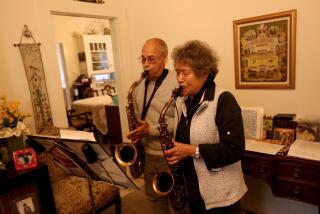A Journey to Mortality and Back Again
- Share via
Before a mysterious, debilitating illness struck him several years ago, philosopher and writer Andrew Bard Schmookler was, in his own words, a “can-do kind of guy,” a “high-energy” person with an “indomitable will” and a “fighting spirit.” A winner.
In his previous books, such as “The Parable of the Tribes” and “Fools Gold,” Schmookler says, he tackled “big questions”--power, war, social evolution, human values in a market economy--”and tried to surround them single-handedly, to storm them by sheer force of irresistible effort.”
Sometime in his 40s, however, his energy flagged, his mood darkened and he lost 20 pounds. Routine work taxed him to the limit; the high-level achievement on which he had based his self-image was no longer possible. He felt that the best part of him had died--that he was “living posthumously.”
Characteristically, Schmookler fought back. He exercised, changed his diet, moved from the Washington, D.C., suburbs to a pollution-free ridge in Virginia’s Shenandoah Valley. He consulted a variety of healers, but his affliction defied diagnosis. Though depressing, it wasn’t exactly depression; though manifesting itself in the body--two hours after playing basketball, Schmookler invariably got a blinding headache--it seemed to have no physical cause.
Finally, he had to “confront both the possibility of defeat despite my best efforts, and the prospect of never again enjoying my vital powers.” He came to realize that these experiences “were an inevitable part of human life.” Even people spared chronic illness must go through “the inescapable process of aging and, finally, death.”
This is hard for anyone to accept. It was especially wrenching for Schmookler, with his driven, combative, somewhat humorless personality. And, he argues, few cultures in history have gone to the lengths modern America has to deny that most of us will grow old and feeble, and all of us will die.
How can we know we will die, and at the same time not know it--just as we children of the Cold War always knew that we were threatened with nuclear annihilation yet lived, most of the time, as if we weren’t?
Schmookler grapples with this question the best he can--and his best, even in his new, gentler, type B incarnation, is pretty good. He’s erudite and tough-minded and also that rare bird, a generalist writing on matters of general interest. The big issues, he knows, aren’t likely to be new issues, and we get our deepest insights by reconsidering the obvious.
Schmookler expands his inquiry to the human condition at large and cites everything from the stories of Zen masters to the latest Newsweek reports of medical trends.
As it happens, while he was writing this book, his malady greatly eased, as mysteriously as it had begun, but his altered awareness remained--”the extent that . . . I recognize in my guts” that “I’m mortal; I’ll not be here forever. Same with you.”
Schmookler allows us no easy exits. He points out that New Age doctrines of spiritual healing mix real advances in our knowledge of the mind-body connection with “a childish reversion to a world where wishes become reality.”
He rejects Rabbi Harold Kushner’s arguments that bad things can happen to good people in a universe ruled by an all-good, all-powerful God. He doesn’t believe in an afterlife. Of Alzheimer’s disease, he says, “the soul didn’t even seem to survive as long as the body, let alone continue after the body’s dissolution.”
But he doesn’t insist on his views--one of the changes, he says, that his illness produced in him. In the end, Schmookler’s message is that a gut knowledge of mortality can make us more tolerant of others, more involved in our communities, less inclined to shun the elderly and sick and disabled, and more appreciative of “the sacred” in what life we have.
Schmookler admits that nobody is completely free of “magical thinking”--that this book is, in part, his ego’s vain attempt to win by losing, to cheat death by writing about it. Still, “Living Posthumously” adds an honest and compassionate voice to a conversation that, unlike the author and his readers, will go on and on.
More to Read
Sign up for our Book Club newsletter
Get the latest news, events and more from the Los Angeles Times Book Club, and help us get L.A. reading and talking.
You may occasionally receive promotional content from the Los Angeles Times.








